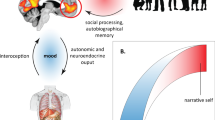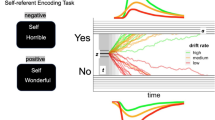Abstract
The present study investigated the degree of consolidation of self-schema content in mildly depressed individuals, individuals cognitively vulnerable to depression (but currently nondepressed), and nonvulnerable-nondepressed controls. All three groups of subjects were presented with pairs of adjectives involving one depressed and one nondepressed content adjective, and were asked to decide which of the two adjectives described them the best (or least). Following this, subjects rated each adjective on a 9-point degree of self-reference scale. On the basis of these two types of self-referent judgments, a measure of decision inconsistency was computed for each subject. In accord with predictions generated from a self-schema model of depression, similar decision inconsistency scores were found for mildly depressed and vulnerable-nondepressed individuals. In turn, both of these groups revealed greater decision inconsistencies than normal controls (the nonvulnerable-nondepressed group). Using the inconsistency measure as an index of the degree of consolidation of self-schema content, these findings suggest that relatively poor consolidation of depressed and nondepressed self-schema content may relate to both the etiology and maintenance of depression.
Similar content being viewed by others
References
Beck, A. T., & Beamesderfer, A. (1974). Assessment of depression: The depression inventory. In P. Pichot (Ed.),Psychological measurements in psychopharmacology and modern pharmacopsychiatry. Basel, Switzerland: Kerger.
Beck, A. T., Ward, C. H., Mendelson, M., Mock, J., & Erbaugh, J. (1985). An inventory for measuring depression.Archives of General Psychiatry, 4 561–571.
Bumberry, W., Oliver, J. M., & McClure, J. N. (1978). Validation of the Beck Depression Inventory in a university population using psychiatric estimates as the criterion.Journal of Consulting and Clinical Psychology, 46 150–155.
Derry, P. A., & Kuiper, N. A. (1981). Schematic processing and self-reference in clinical depression.Journal of Abnormal Psychology, 90 286–297.
Dobson, K. S., & Breiter, H. J. (1983). Cognitive assessment of depression: Reliability and validity of three measures.Journal of Abnormal Psychology, 92 107–109.
Eaves, G., & Rush, A. J. (1984). Cognitive patterns in symptomatic and remitted unipolar major depression.Journal of Abnormal Psychology, 93 31–40.
Keller, K. E. (1983). Dysfunctional attitudes and the cognitve therapy for depression.Cognitive Therapy and Research, 7 437–444.
Kuiper, N. A., & Derry, P. A. (1981). The self as cognitive prototype: An application to person perception and depression. In N. Cantor & J. Kihlstrom (Eds.),Personality, cognition, and social interaction. Hillsdale, New Jersey: Erlbaum.
Kuiper, N. A., & Derry, P. A. (1982). Depressed and nondepressed content self-reference in mild depressives.Journal of Personality, 50 67–79.
Kuiper, N. A., Derry, P. A., & MacDonald, M. R. (1982). Self-reference and person perception in depression: A social cognition perspective. In G. Weary & H. Mirels (Eds.),Integrations of clinical and social psychology. New York: Oxford University Press.
Kuiper, N. A., & MacDonald, M. R. (1982). Self and other perception in mild depressives.Social Cognition, 1 223–239.
Kuiper, N. A., MacDonald, M. R., & Derry, P. A. (1983). Parameters of a depressive self-schema. In J. Suls & A. G. Greenwald (Eds.),Psychological perspectives on the self (Vol. 2, pp. 191–218). Hillsdale, New Jersey: Erlbaum.
Kuiper, N. A., & Olinger, L. J. (in press). Dysfunctional attitudes and a self-worth contingency model of depression. In P. C. Kendall (ed.),Advances in cognitive-behavioral research and therapy (Vol. 5). New York: Academic Press.
Kuiper, N. A., Olinger, L. J., MacDonald, M. R., & Shaw, B. F. (1985). Self-schema processing of depressed and nondepressed content: The effects of vulnerability to depression.Social Cognition, 3 77–93.
MacDonald, M. R., & Kuiper, N. A. (1984). Self-schema decision consistency in clinical depressives.Journal of Social and Clinical Psychology, 2 264–272.
MacDonald, M. R., & Kuiper, N. A. (1985). Efficiency and automaticity of self-schema processing in clinical depressives.Motivation and Emotion, 9 171–184.
Rholes, W., Risking, J. H., & Neville, B. (1975). The relationship of cognitions and hopelessness to depression and anxiety.Social Cognition, 3 36–50.
Rogers, T. B., Kuiper, N. A., & Rogers, P. J. (1979). Symbolic distance and congruity effects for paired-comparisons judgments of degree of self-reference.Journal of Research in Personality, 13 433–449.
Vezina, J., & Bourgue, P. (1984). The relationship between cognitive structures and symptoms of depression in the elderly.Cognitive Therapy and Research, 8 29–36.
Weissman, A. N. (1980).Assessing depressogenic attitudes: A validation study. Paper presented at the 51st Annual Meeting of the Eastern Psychological Association, Hartford, Connecticut.
Wessman, A. N., & Beck, A. T. (1978).Development and validation of the Dysfunctional Attitude Scale: A preliminary investigation. Paper presented at the American Educational Research Association Annual Convention, Toronto.
Author information
Authors and Affiliations
Rights and permissions
About this article
Cite this article
MacDonald, M.R., Kuiper, N.A. & Olinger, L.J. Vulnerability to depression, mild depression, and degree of self-schema consolidation. Motiv Emot 9, 369–379 (1985). https://doi.org/10.1007/BF00992206
Issue Date:
DOI: https://doi.org/10.1007/BF00992206




